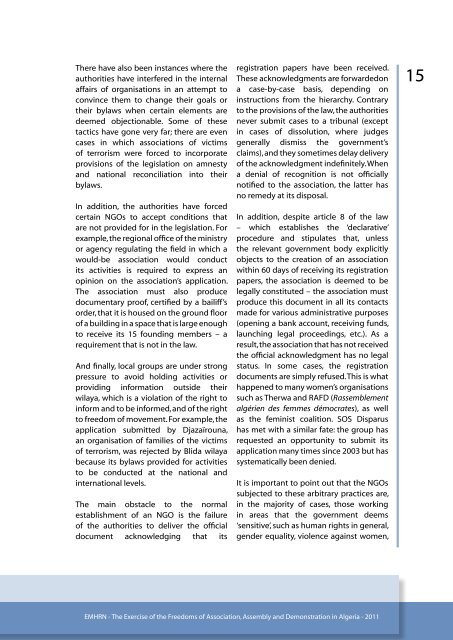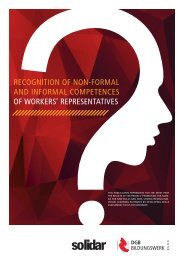Algeria - Solidar
Algeria - Solidar
Algeria - Solidar
You also want an ePaper? Increase the reach of your titles
YUMPU automatically turns print PDFs into web optimized ePapers that Google loves.
There have also been instances where the<br />
authorities have interfered in the internal<br />
affairs of organisations in an attempt to<br />
convince them to change their goals or<br />
their bylaws when certain elements are<br />
deemed objectionable. Some of these<br />
tactics have gone very far; there are even<br />
cases in which associations of victims<br />
of terrorism were forced to incorporate<br />
provisions of the legislation on amnesty<br />
and national reconciliation into their<br />
bylaws.<br />
In addition, the authorities have forced<br />
certain NGOs to accept conditions that<br />
are not provided for in the legislation. For<br />
example, the regional office of the ministry<br />
or agency regulating the field in which a<br />
would-be association would conduct<br />
its activities is required to express an<br />
opinion on the association’s application.<br />
The association must also produce<br />
documentary proof, certified by a bailiff’s<br />
order, that it is housed on the ground floor<br />
of a building in a space that is large enough<br />
to receive its 15 founding members – a<br />
requirement that is not in the law.<br />
And finally, local groups are under strong<br />
pressure to avoid holding activities or<br />
providing information outside their<br />
wilaya, which is a violation of the right to<br />
inform and to be informed, and of the right<br />
to freedom of movement. For example, the<br />
application submitted by Djazaïrouna,<br />
an organisation of families of the victims<br />
of terrorism, was rejected by Blida wilaya<br />
because its bylaws provided for activities<br />
to be conducted at the national and<br />
international levels.<br />
The main obstacle to the normal<br />
establishment of an NGO is the failure<br />
of the authorities to deliver the official<br />
document acknowledging that its<br />
registration papers have been received.<br />
These acknowledgments are forwardedon<br />
a case-by-case basis, depending on<br />
instructions from the hierarchy. Contrary<br />
to the provisions of the law, the authorities<br />
never submit cases to a tribunal (except<br />
in cases of dissolution, where judges<br />
generally dismiss the government’s<br />
claims), and they sometimes delay delivery<br />
of the acknowledgment indefinitely. When<br />
a denial of recognition is not officially<br />
notified to the association, the latter has<br />
no remedy at its disposal.<br />
In addition, despite article 8 of the law<br />
– which establishes the ‘declarative’<br />
procedure and stipulates that, unless<br />
the relevant government body explicitly<br />
objects to the creation of an association<br />
within 60 days of receiving its registration<br />
papers, the association is deemed to be<br />
legally constituted – the association must<br />
produce this document in all its contacts<br />
made for various administrative purposes<br />
(opening a bank account, receiving funds,<br />
launching legal proceedings, etc.). As a<br />
result, the association that has not received<br />
the official acknowledgment has no legal<br />
status. In some cases, the registration<br />
documents are simply refused. This is what<br />
happened to many women’s organisations<br />
such as Therwa and RAFD (Rassemblement<br />
algérien des femmes démocrates), as well<br />
as the feminist coalition. SOS Disparus<br />
has met with a similar fate: the group has<br />
requested an opportunity to submit its<br />
application many times since 2003 but has<br />
systematically been denied.<br />
It is important to point out that the NGOs<br />
subjected to these arbitrary practices are,<br />
in the majority of cases, those working<br />
in areas that the government deems<br />
‘sensitive’, such as human rights in general,<br />
gender equality, violence against women,<br />
15<br />
EMHRN - The Exercise of the Freedoms of Association, Assembly and Demonstration in <strong>Algeria</strong> - 2011

















